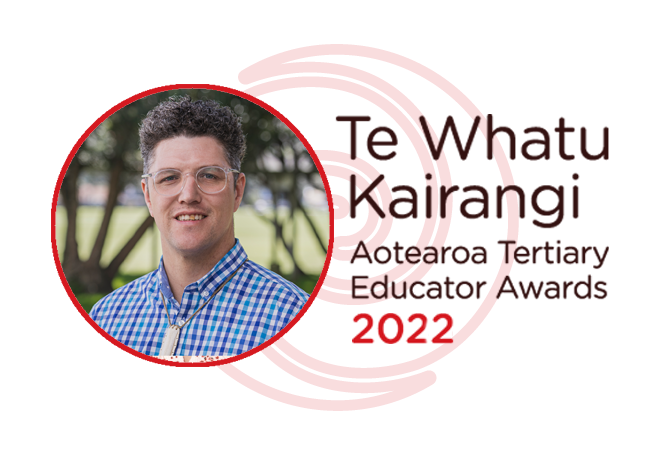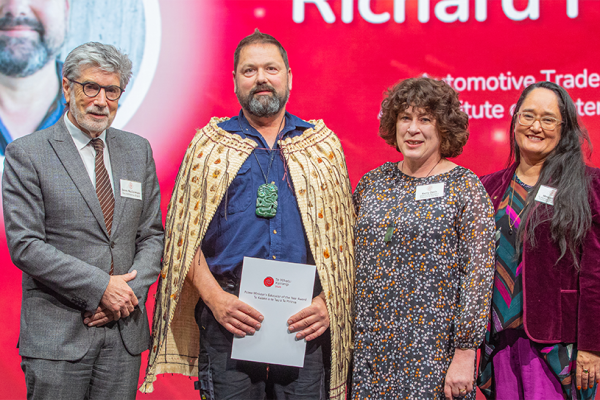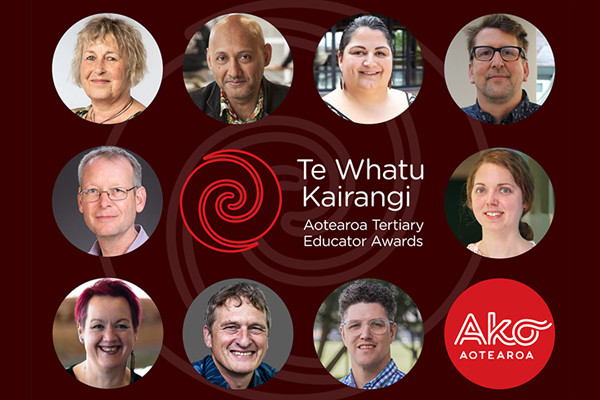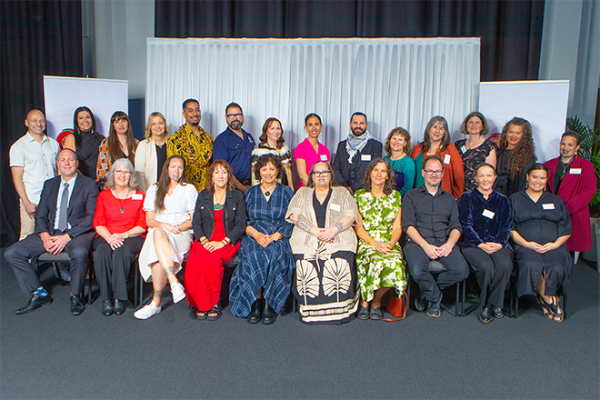Jamie Smiler
One ākonga at a time
Te Whatu Kairangi Award | Kaupapa Māori
Senior Academic in Tourism, Te Whare Wānanga o te Awakairangi | Wellington Institute of Technology
Watch Jamie Smiler's Teaching profile video
“As a Māori educator, I celebrate vocational education. It connects the abstract world of theory with the concrete reality of praxis. It connects what ought to happen with what actually happens.”
As a Māori educator, Jamie sees education as an instrument to bring about freedom, rather than conformity. He uses education as a liberating force to equip students with the tools to be able to seek purpose and freedoms to support themselves, their whānau, hapū, and iwi. His approach always connects theory with practice and he encourages students to take every opportunity to engage with their world. He tells new cohorts of students, “these four walls are not our classroom – the world is our classroom”. By bringing world issues into the classroom, he believes they can be solved by our future leaders.
Thus, Jamie’s version of vocational education is unapologetically practical. He aims to create practical business leaders, with the skills and a sense of purpose to transform themselves, as well as their whānau, their hapū, their iwi and Aotearoa. This is his mission and practice with his colleagues, students, and the diverse set of communities they serve. Being Māori, he takes his position seriously in contributing to supporting ākonga, whānau, hapū and iwi to live lives that are culturally filling and economically prosperous, enabling them to support the work being done to create intergenerational prosperity. Equally important is his role as an educator. He understands the work that needs to be done within the education system to enable it to meet its potential in transforming socio-cultural, economic, and political outcomes for people.
“This is why I am an educator. I believe I can contribute. I know how it changes the lives not only of ākonga but also their whānau, hapū and iwi. My contribution is made one class at a time, one ākonga at a time, one story of success at a time.”
As a Māori educator, Jamie acknowledges the strong influence of the Kaupapa Māori educational philosophies of Graham Hingangaroa Smith, Leonie Pihama, Linda Tuhiwai Smith, Mason Durie, Wally Penetito, and Russel Bishop. Jamie incorporates their guiding principles into his teaching practice, such as: tino rangatiratanga, ngā taonga tuku iho, akoranga Māori, kia piki ake i ngā raru i te kāinga, whānau, and kaupapa; understanding the impact of historical and ongoing practices of colonisation on our education system and how it impacts ākonga and our communities; understanding the different dimensions of health and success and how to draw upon Mātauranga Māori to support communities to not only live more prosperous lives but how to live them as Māori; insight into the contested nature of knowledge and education and socially unjust reality for many communities and the need to actively mediate these inequalities, and the importance of relationships and whanaungatanga as a necessary practice for one to be an effective educator. The philosophies of Paolo Freire, Henry Giroux, and Pierre Bourdieu also give him a deeper understanding of the politics of education and the importance of developing a ‘dialogical’ approach to teaching, holistic education, and critical pedagogies.
Jamie has worked to effect change in both face-to-face and virtual classrooms. He says although the fundamentals of being a great teacher have not changed much over the past fifty years, the context, our environment, and the technologies available to educators have. He has developed innovative approaches to teaching, learning, and assessment to support ākonga success. These include engagement with the political reality of the real world (presenting on infrastructure issues such as Three Waters), real world projects and communication demands (simulating a real-life contracting situation), and engaging in real-life, real-time Te Tiriti issues (such as critically investigating the development of a locally contested land development between a group of mana whenua stakeholders and a local land developer). He is also a strong advocate for the use of technologies that enhance the learning experience for ākonga and uses many strategies in his classes to support student achievement, often finding some of the simplest strategies the best. He finds productivity-improving technologies necessary when teaching vocational programmes that have an emphasis on connecting theory with reality to cohorts of more than 80 students, such as shared documents for group activities, Kanban boards and reflexive practices.
Jamie finds one of the most satisfying aspects of being an educator is getting to see his ākonga walk across the stage at graduation, and he has many success stories to tell. One is of an ākonga who finished as one of the top students in her Diploma in Tourism class, although she had not been in education for over 35 years, and went on to graduate with a Bachelor of Applied Business Management. In 2018-2019, around 20 of his students gained employment with the KiwiRail Group in roles with pay and conditions capable of supporting not only themselves but their larger whānau groupings. As well as teaching business programmes for WelTec and Whitireia, Jamie is also actively involved in areas of education within other organisations. At Victoria University, he has taught and offered professional development in its Executive Education programmes (MBA) and also has a role as a Mātauranga Māori advisor at the Open Polytechnic on the development of their Bachelor of Engineering Technology and New Zealand Diploma in Engineering with specialisations in Mechanical and Civil Engineering. As a project manager before becoming an educator, Jamie was acutely aware of the large number of Māori employed in these industries, usually in lower-paid, ‘unskilled’ labouring and machine operator roles. He blames an underdeveloped educational system for not moving Māori into higher-paying, higher-skill roles of designing and project managing. Because Māori are not appropriately represented in such occupations, Jamie’s role as a Mātauranga Māori advisor on engineering programmes has helped shape the curriculum so that more Māori will enrol in programmes that involve Māori ways of knowing and learning, enabling them to be more successful.
In his position as a Māori educator, Jamie helps drive structural change within tertiary education institutions. He provides strategic policy and governance direction to his Senior Leadership Team and Board of Directors so that policy is more likely to be effective, including the Tekau-Rima strategy which seeks to transform his organisation by doubling the number of Māori it employs by 2026. He works with a collective of Māori staff who now hold formal paid roles as Kaihautū with different portfolios of interests based on Te Pūkenga’s strategic priorities within its Te Pae Tawhiti – Te Tiriti Excellence Framework. He is a member of the Staff Reference Group, which advocates for staff interests and helped implement initiatives, such as an annual staff hui, flexible work options, a Mātaiwhetū rewards Programme, and wellness activities and procedures.
“Yes, we make change in the classroom, one ākonga at a time, however, to maximise our effectiveness we need to be using our positions to drive structural change within our institutions.”



